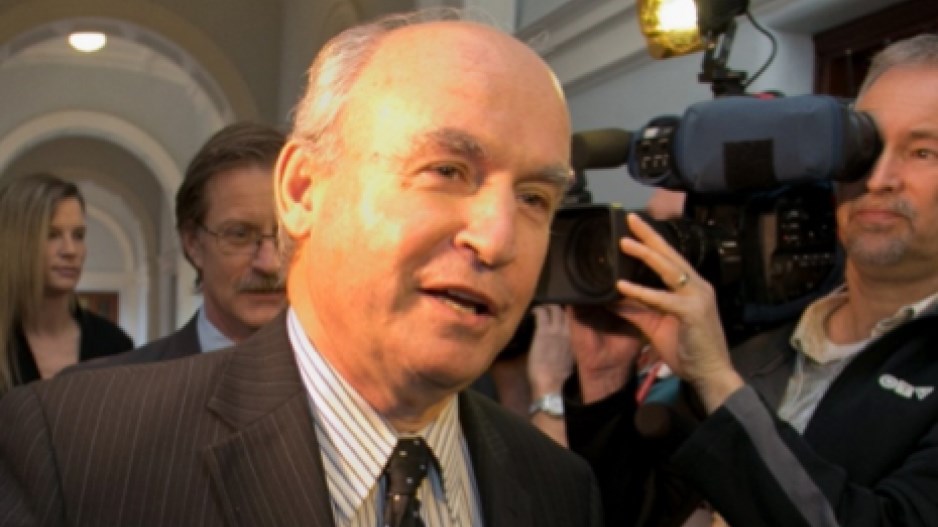BC Hydro rates will skyrocket 25.5% over the next five years as part of a long-term rate plan unveiled by the British Columbia government today.
Energy Minister Bill Bennett unveiled a 10-year "predictable rates" plan, which will see increases of 9% and 6% in the first two years, followed by maximum increases of 4%, 3.5% and 3% in following years.
Compounded yearly, it's a 28% increase over five years.
That adds up to an average increase of $25 a month by 2019, according to government figures.
The hikes begin April 1.
The rates for the final five years of the 10-year plan weren't immediately revealed, but Bennett said he expects around 2.5% a year.
That means taxpayers could face a 10-year rate increase of around 38%.
"We believe it is a balanced and responsible 10 year plan," said Bennett. "It keeps rates as low as possible while BC Hydro makes some investments in the system."
Hydro will spend an average of $1.7 billion a year in capital projects, said CEO Charles Reid. Reid argued the average B.C. home pays $3 a day for electricity, which, adjusted for inflation, has not changed much in decades.
The electricity rate hikes had been widely expected after a leaked BC Hydro document earlier this year forecast a 26.4% price increase over two years.
"We decided an increase of that magnitude was not acceptable," said Bennett. Instead, under the new plan, the two-year increase is 15.6%.
Hydro has billions stored away in long-term debt, also known as deferral accounts. The practice of pushing off debt into the future, to give the appearance of annual profitability now, has been criticized by the province's Auditor General.
The B.C. government will pay off the 20% of deferral accounts that aren't already scheduled to be paid off through rate increases, said Bennett.
However, he also acknowledged $1 billion will eventually be put into a new deferral account to smooth out rates in coming years.
The government will also wean itself off annual dividends that it forces BC Hydro to pay back into general revenue.
"We're going to wean government off the dividend payments over a five-year period, allowing BC Hydro to retain cash to fund their capital projects," said Bennett.
"It means they will borrow less because they will have more cash."
Hydro will have $3 billion in extra cash over 10 years to pay for capital projects and the government will take $2 billion less out of BC Hydro's revenue.
Hydro is "delighted" by those changes because it has been asking for government to take away less cash for years, said Reid.
Hydro will also shut the Burrard thermal generating plant, reduce its operating costs and cut 120 staff positions in the next few days, said Reid.
NDP energy critic John Horgan said the Liberal government has broken its promise not to raise hydro rates and said taxpayers are getting "whacked in the face by liars" with the hikes.
The Liberals argued they only promised not to increase hydro rates because of the northwest transmission line project and did not make a general promise not to raise rates.
He said Bennett didn't even address independent power producer contracts, which BC Hydro is losing money on as well.
Bennett acknowledged taxpayers won't be happy, even though B.C. still has one of the lowest electricity rates in North America.
"Will anybody be jumping up and down today saying, 'Yeah, government raised my hydro rates?'" asked Bennett.
"No, I'm pretty sure they won't. But in the context of what everybody in the continent pays for electricity rates, I think it is affordable."
Bennett added that today's announcement will give historic industrial customers in the province such as pulp mills, sawmills and mines some certainty about rates for the future.
"Industrial electricity rates are very important for them," said Bennett.
"They said to me 'we need to know where this is going.'"
Technically, BC Hydro rates are supposed to be approved by the independent BC Utilities Commission (BCUC). However, the government has ordered the last several rates and bypassed the BCUC.
The commission will now undergo a review to improve its effectiveness and efficiency, as part of the ongoing government core review process, said Bennett.
It is hoped the BCUC will set the rates after 2016, said Bennett.
- with files from Sean Kolenko




